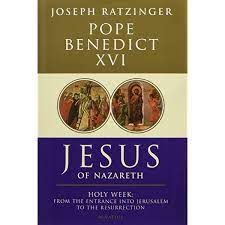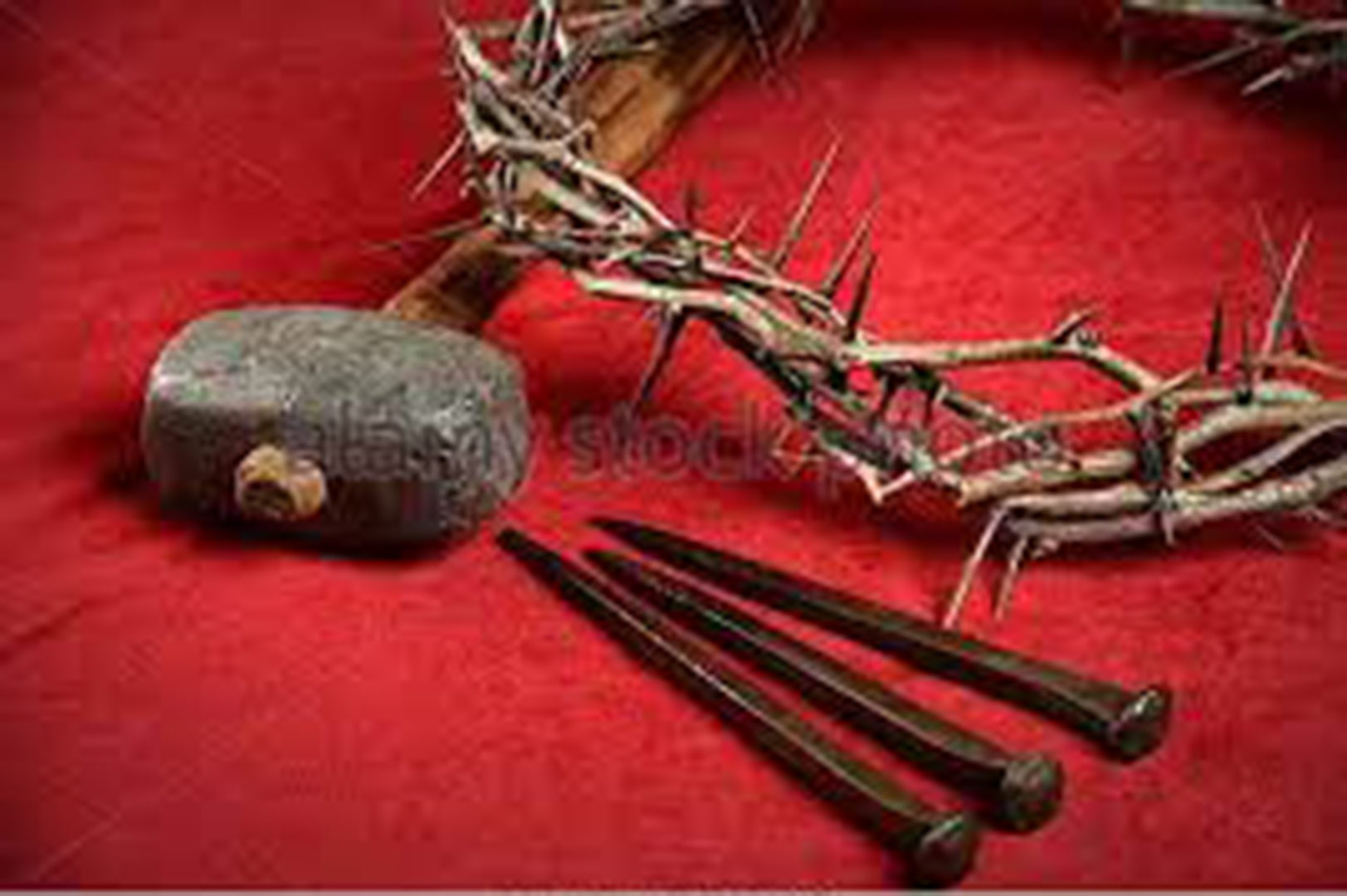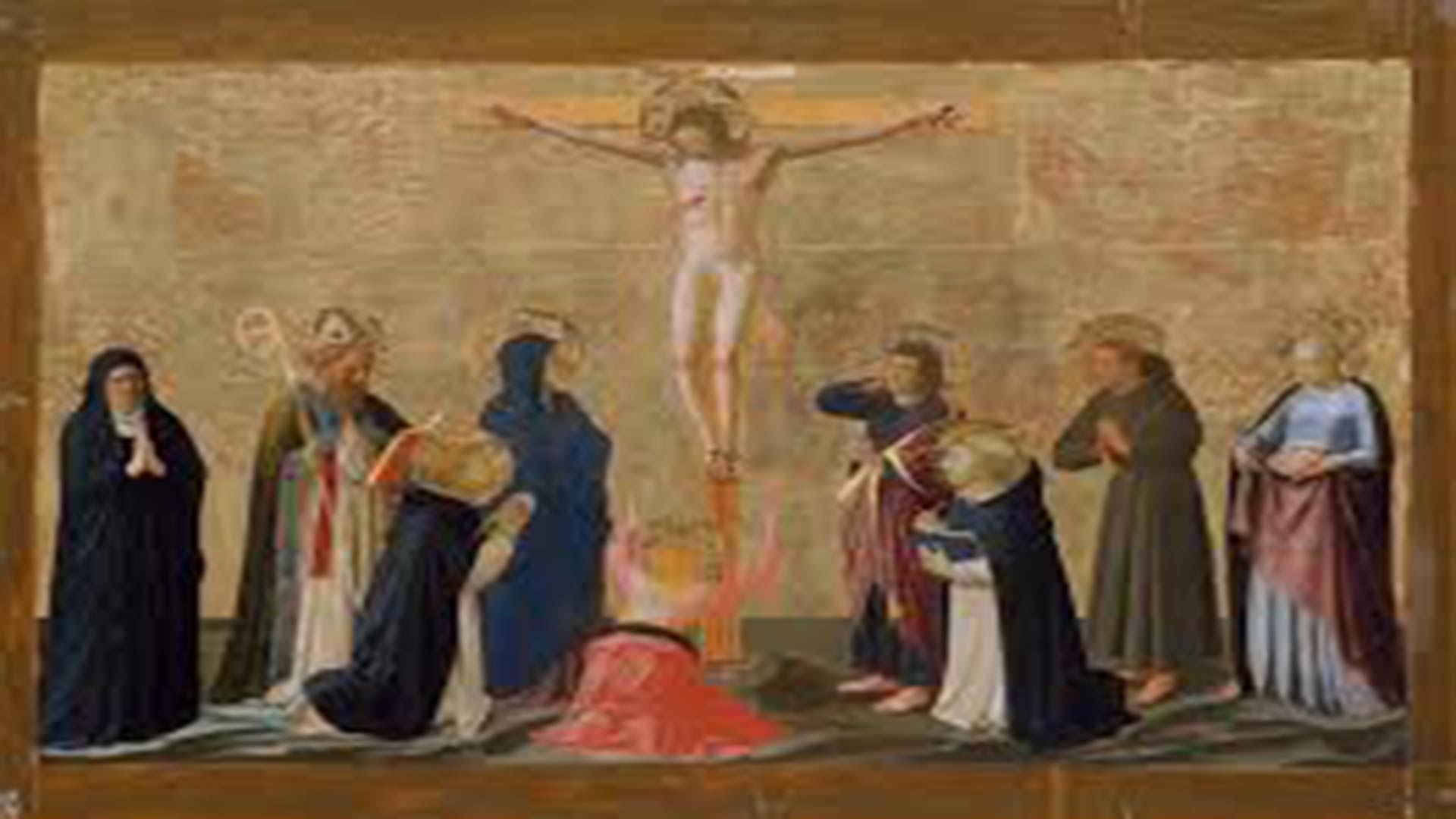The Nails of the Crucifixion

In the last month or so, several national governments came face to face with people’s wrath. Legitimate monarchs were in the firing line and some self-styled royals summarily ousted. Such things happen all the time in the rough-and-tumble of politics and are child’s play if we consider that, two thousand years ago, the Man who was God was crucified by his countrymen: The Creator of the Universe was destroyed, the Giver of Life put to death, the King of Kings who had deigned to visit his people, unceremoniously eliminated from the face of the earth.
Unlike worldly rulers, who collapse under the weight of their sins, Jesus Christ was executed without good reason. In fact, He was killed because He was righteous; He died to save us from the scourge of sin! What abnegation, what nobility! On the other hand, there were no prolonged hearings, no intention to ascertain the truth, no mercy…. There was only injustice, lies, brutality, ingratitude…. The annihilation of Jesus Christ was and will undoubtedly remain the worst crime perpetrated in history.

This was also an earth-shattering event for which the Chosen Race became accountable – alas, an irreversible act that the followers of Christ have had to painfully endure ever since. It caused them to have a mental block against the Jewish people; thankfully, neither the Church came to regard the Gospels as a basis for anti-Judaism nor did Christians hold out against individual Jews. Yet, the head of the World Jewish Congress, Ronald Lauder, recently accused the Christians of being silent spectators to the persecution of Jews.
Be that as it may, whether or not it was for the Jews to apologize to the Christians can be debated till the end of times. Without going into the long story of that failed relationship, it may be recalled that Pope Pius XII made efforts to mitigate the fall-out of what Churchill dubbed “a monstrous tyranny, never surpassed in the dark and lamentable catalogue of human crime.” In 1964, Vatican Council II issued a document, Nostra Aetate (‘In Our Times’), repudiating the notion of collective Jewish guilt for Jesus Christ’s death. Later, Pope John Paul II famously held out his hand to the Jews; and a couple of months ago, in his second volume of Jesus of Nazareth, Pope Benedict XVI ascribed that guilt not to “the Jewish people as a whole” but to the “aristocracy of the temple”, to the “masses” who acclaimed Barrabas, and to the Roman rulers who endorsed their demands.

The aggrieved Catholic Church thus moved beyond individual and racial considerations to ponder the greatest watershed in the history of humankind! The unparalleled magnitude of the crucifixion and death of Iesvs Nazarenvs Rex Ivdaeorvm (‘Jesus Christ, King of the Jews’, the INRI plaque on every crucifix) was an event infinitely more decisive than the fall of any emperor! As the Catholic apologist Steve Ray puts it, in Jesus’ death God “rewound history”: Eden became Gethsemani and Satan, Judas! Whereas at Eden death stuck into the Tree of Life, at Calvary life sprang up at the Tree of Death.
That speaks volumes about the centrality of Christ in meta-history. As we relive His saga, year after year, through the sorrowful spectacle of Lent and the glorious phenomenon that is Easter, we realize that we need no scapegoats. As members of the human race, you and I are those proverbial Jews and Romans, transposed across the centuries! Human nature has been the same for aeons; so, had we lived in Jesus’ time, maybe we would have been no different from those Jews and Romans! The Jew in us stands out even today, when we distort His teachings; and the Roman in us, when we hail the distortion. Our offences are the nails of modern-day Crucifixion; our rejection of the Message and the Messenger, an eloquent re-enactment of it!

We can turn a new leaf in our lives by repenting for our faults. Adam and Eve’s lapse was called felix culpa, a fortunate fault, because it eventually won us a great and good Redeemer. But our faults don’t qualify likewise; so we should first make a clean breast of our sins, saying: Nostra culpa, nostra culpa, nostra maxima culpa – Our fault, our fault, our very great fault! Next, we should readily embrace the Cross, not to invite suffering but to accept its myriad forms through the ups-and-downs of our daily life. Even a light feel of the Crucifixion on our skin might inspire us to atone for our maxima culpa in our own little way….
No defeated king has ever come back to his pristine splendour – except Jesus Christ! Let’s keep the faith, and we too shall have a share in the glory that was His on the third day and will be so for ever more.
(First published in Herald, Panjim, 22 April 2011)
Crucifying the King, in Meta-history
In the last few weeks the world witnessed momentous political changes after several national governments went crumbling like packs of cards. In some of those countries legitimate monarchies were overthrown and in others self-styled royals were summarily ousted.
There is a sense of déjà vu in those events. They are child’s play if we consider that two thousand years ago the Man who was God was crucified by his countrymen. The Creator of the Universe was destroyed, the Giver of Life put to death. The King of Kings who had deigned to visit his people was unceremoniously eliminated from the face of the earth.
In contrast with worldly kings, who generally collapse under the weight of their own misdeeds, Our Lord Jesus Christ was executed without good reason, or rather, because he was righteous. There were no prolonged hearings, no intention to ascertain the truth, no mercy…. There was only injustice, lies, brutality, ingratitude…. The annihilation of Our Lord was without a doubt the greatest crime ever perpetrated in history, and shall remain so to the end of times.
It was also one earth-shattering event that the Chosen Race became answerable for; it was an irreversible act that the followers of Christ have had to painfully endure ever since. No doubt it caused the Church to have a mental block against the Jewish people, who themselves held one against the Egyptians; but, thankfully, the bitterness was not of catastrophic proportions. Neither did the Church regard the Gospels as a basis for anti-Judaism nor did individual Christians persecute the Jews. Yet, the head of the World Jewish Congress, Ronald Lauder, read insidiously into it all, when, as perpetrators of the crime, it was for the Jews to apologize to the Christians, and not the other way around.
Well, this can be debated till the end of times; the undeniable fact is that neither side was proactive in dissipating ill feelings. It is not for us here to recount the long story of that failed relationship; but it is pertinent to note that Pope Pius XII made personal and official efforts to mitigate anti-Semitism in Germany, or what Churchill dubbed “a monstrous tyranny, never surpassed in the dark, lamentable catalogue of human crime.” In 1964, Vatican Council II for the first time issued a document, Nostra Aetate (‘In Our Times’), repudiating the notion of collective Jewish guilt for Jesus Christ’s death. And recently, in his second volume of Jesus of Nazareth, Pope Benedict XVI ascribed that guilt not to “the Jewish people as a whole” but to the “aristocracy of the temple” and the “masses” who had acclaimed Barrabas, and whose cries were endorsed by their Roman rulers.
Thus, the Catholic Church, albeit the aggrieved party, moved on beyond individuals and races, to reflect on what was indeed a watershed in the history of humankind! The superhuman magnitude of the crucifixion and death of Iesvs Nazarenvs Rex Ivdaeorvm made it an event infinitely more critical than the fall of the most magnificent of the world’s emperors! In Jesus’ death humanity had a flashback of history: Eden became Gethsemani and Satan, Judas. But the dark clouds of Good Friday had a silver lining to them: Whereas at Eden death had stuck into the Tree of Life, at Calvary life sprang up at the Tree of Death. It was God unmistakably reaffirming His supremacy over Creation – a tying up of loose ends in meta-history.
While we have an occasion to relive this saga, year after year, through the sorrowful spectacle of Lent and the glorious phenomenon of Easter, an honest introspection would quickly show that we need no distant scapegoats for the death of Jesus: As a human race we ourselves are those proverbial Jews and Romans transposed to the twenty-first century. Human nature has run for aeons, connecting thousands of generations through good and evil, so we can’t ever claim that we would have been any different as contemporaries of Jesus. We often reject the Message and the Messenger; we crucify Him every single day of our lives.
It is therefore important for us to turn a new leaf by repenting for our faults. Adam and Eve’s was a felix culpa, which won us so great and so good a Redeemer; but I’m afraid our faults don’t qualify in the same way, so we shall have to always say Nostra culpa, nostra culpa, nostra maxima culpa. And if we wish to fully partake of God’s salvation plan, there is no better way than to embrace the Cross – to make the way of the Cross our way of life – which is not to invite but only quietly accept the myriad forms of suffering through the ups-and-downs of our daily life. It will give us at least a pale sense of the Crucifixion and an occasion to atone for our maxima culpa in our own little way.
No defeated king ever returned to his pristine splendour. Only Our Lord did! If we keep the faith, we too will have a share in the glory that was His on the third day and will be so for ever more.
(Renovação, Vol. XL, No. 8, 16-30 April 2011)

